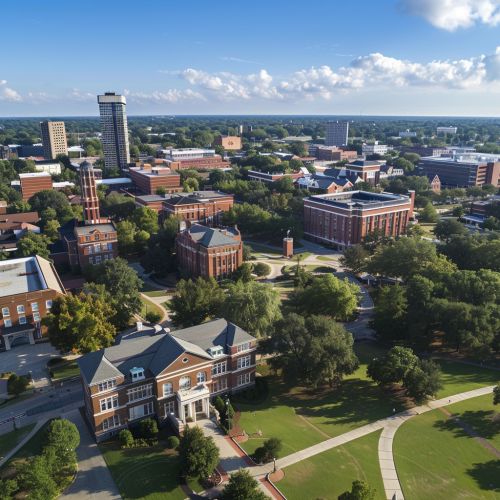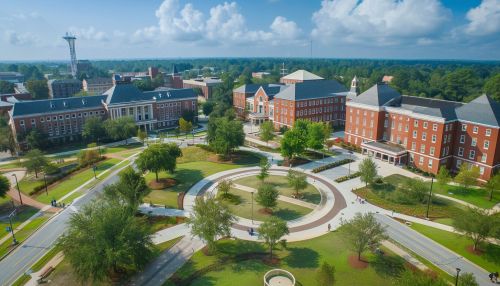Alabama State University
History
Alabama State University (ASU) is a historically black university located in Montgomery, Alabama. It was founded in 1867 by nine freed slaves, known as the Marion Nine, as the Lincoln Normal School of Marion. The institution was established to provide education for African Americans during the Reconstruction era. In 1887, the school moved to Montgomery and became the State Normal School for Colored Students. It was renamed Alabama State College in 1929 and finally became Alabama State University in 1969.
Campus
The ASU campus is situated on 172 acres in Montgomery, Alabama. It features a mix of historic and modern buildings, including the iconic Dunn-Oliver Acadome, which serves as the primary venue for basketball games and other events. The campus also includes the Levi Watkins Learning Center, a comprehensive library and research facility, and the Tullibody Fine Arts Center, which houses the university's music and theater programs.


Academics
ASU offers a wide range of undergraduate and graduate programs across various disciplines. The university is organized into several colleges and schools, including:
- College of Liberal Arts and Social Sciences
- College of Education
- College of Business Administration
- College of Health Sciences
- College of Science, Mathematics, and Technology
- College of Visual and Performing Arts
The university is accredited by the Southern Association of Colleges and Schools (SACS) and offers over 50 undergraduate and graduate degree programs. Notable programs include the Master of Science in Prosthetics and Orthotics, the Doctor of Physical Therapy, and the Master of Rehabilitation Counseling.
Research
ASU is committed to advancing knowledge through research and innovation. The university houses several research centers and institutes, including the Center for Nanobiotechnology Research, the National Center for the Study of Civil Rights and African-American Culture, and the Center for Leadership and Public Policy. These centers focus on a wide range of topics, from nanotechnology and biotechnology to civil rights history and public policy.
Athletics
ASU's athletic teams, known as the Hornets, compete in the Southwestern Athletic Conference (SWAC) of the NCAA Division I. The university offers a variety of sports, including football, basketball, baseball, track and field, and volleyball. The Hornets' football team plays its home games at the ASU Stadium, a state-of-the-art facility that opened in 2012.
Student Life
ASU offers a vibrant student life with numerous opportunities for involvement and engagement. The university has over 70 student organizations, including fraternities and sororities, academic clubs, and cultural organizations. The Student Government Association (SGA) plays a crucial role in representing student interests and organizing campus events.
Notable Alumni
ASU has produced many distinguished alumni who have made significant contributions in various fields. Some notable alumni include:
- Ralph David Abernathy, civil rights leader and co-founder of the Southern Christian Leadership Conference (SCLC)
- Fred Gray, prominent civil rights attorney
- Tullibody Hall, educator and namesake of the Tullibody Fine Arts Center
- Earl Hilliard, former U.S. Congressman
See Also
- Historically black colleges and universities
- Montgomery, Alabama
- Southern Association of Colleges and Schools
- Southwestern Athletic Conference
- Civil rights movement
